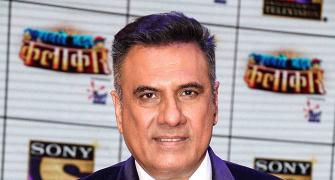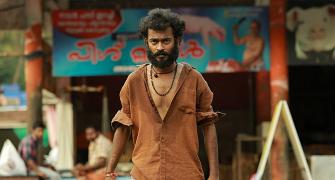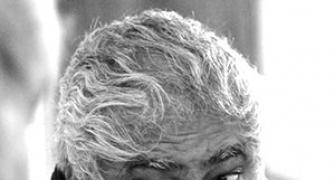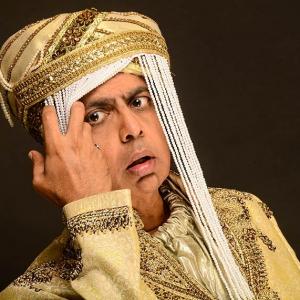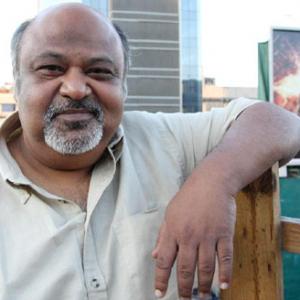'We still look at films with A-listers.'
'There is change, but it's minor.'
'We still haven't learnt how to invest in stories.'
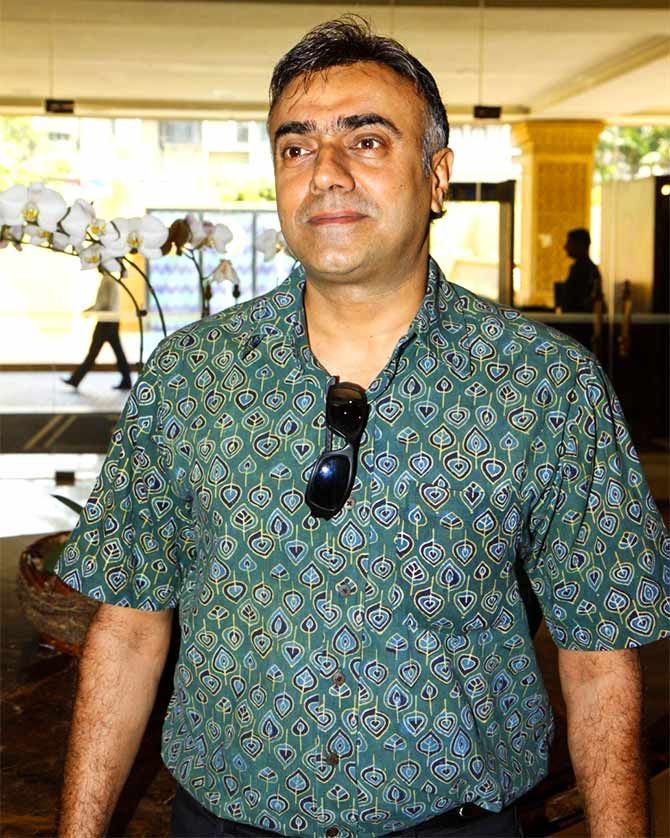
Rajit Kapoor, who has been a beautiful part of so many important Hindi films, seemed tied to his family's textile business until Shyam Benegal showed him a better future.
Today, Benegal and Kapoor have done more than 10 films together.
Kapoor will be seen in a small but pivotal role in Begum Jaan. He tells Rediff.com's Patcy N what it was like working with 11 women, and why he picks Udaan as the best film of the decade.
Tell us about your role in Begum Jaan.
At one time, there was no Hindu-Muslim (conflict). We were all one.
Suddenly, there was a division and then Partition. Suddenly your friend and neighbour was on the opposing side.
That's how my character finds himself (with Ashish Vidyarathi's character in the film). Both of them must have worked for the Congress, but now one is a part of the Muslim League and the other is in the Congress.
The fact that they are friends makes it very interesting. They have known each other ever since they were children.
Even after all the problems, they inquire about each other's family.
So they have a past, but now they have to sort things out across the table.
Did you watch Rajkahini before working on Begum Jaan?
No. Neither did I want to watch it nor did the director want me to.
If the director wants you to bring something on the table as an actor, he will not refer to that.
What was the shooting experience in Jharkhand like?
The film is shot on the borders of both Punjab and Jharkhand. There were tough conditions while shooting the film. Hats off to Srijit (Mukherjee, the film's director) for pulling this off.
At one point, the sets were blown away! The rains and winds came unexpectedly.
We are shooting in the sunlight. Within 10 seconds, it was dark. The scenes were left incomplete.
How do you come back to it for the continuity? We faced a lot of problems, but he did not crack up like a normal person in his place would.
I have worked with Srijit before -- I played the villain in his Bengali film Mishawr Rawhoshyo.
I had already built a rapport with him, there's a certain trust between us.
And working with 11 women, including Vidya Balan?
It was madness! They enjoyed the attention that the few men around them gave.
I wish I had more to interact with Vidya; I only have some confrontational scenes with her. She was friendly with everyone.
Tell us about yourself.
I am born in Amritsar. I shifted to Mumbai when I was barely two.
My father is a businessman; we used to be in textiles, exporting garments. I did it for 20 years.
I started acting in school and continued in college -- not just acting, I was a part of every extracurricular activity related to the performing arts. I just wanted to be on stage!
When I decided to act and informed my parents, there were fireworks at home.
They wanted me to be part of the family business as the film industry was so uncertain -- they didn't even look at it as a profession then.
Today, 25 years later, parents come with their 20 year olds and say, 'Hamari ladki ko actress bana do.' At that time, it was look down upon.
My father said, 'Actor ban na hai? Have you seen the mirror? Hangar lagta hai, actor kya banega?'
Mom had nothing to do with it, she dismissed it as 'shauk.'
I wanted to join the NSD (National School of Drama), but did not ask them. I knew how upset they were.
I tore up the form and continued working with my father and doing theatre.
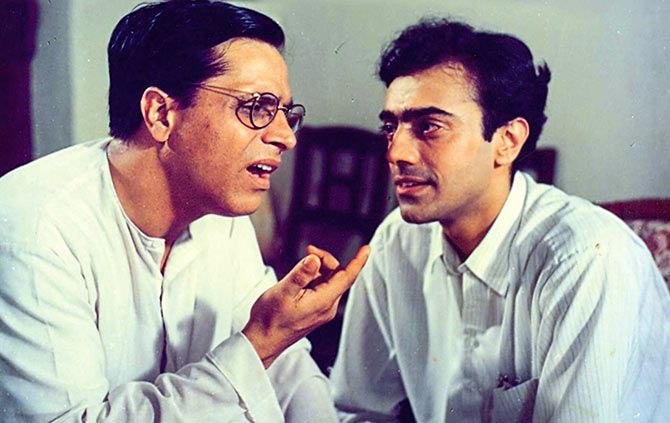
At the beginning of the career, you struck gold with Byomkesh Bakshi.
We shot for Byomkesh Bakshi in 1991 before my first feature film Suraj Ka Satvan Ghoda, which released the next year.
Shoojit Sen was a part of the series Yugantar on Doodarshan. I played Michael Madhusudhan Dutt, the young poet, who dies early in it.
Shoojit Sen recommended my name to Basu Chatterjee. Basuda saw one or two episodes and called me. He asked me to read the episodes and tell him what I thought.
After I did it, I became famous.
Even now people may not remember my name, but they remember my series.
I think it was also because there was just one (television) channel at that time.
The stories were effective. They were simple for people to identify with and the language was clear.
It appealed to everyone from age six to 60.
My chemist did not give me medicine once. He was shutting his shop at 8:40 pm. He wanted to go home and watch the serial at 9.
People would call me to solve cases. In Kolkata, people would follow me thinking I was on a detective chase.
At restaurants, people would ask what I'd come to solve there.
Some newspaper gave out my office address and I got many fan mails and letters asking me to solve cases in villages in Uttar Pradesh and Madhya Pradesh.
After you became popular, did your parents accept your professional choice?
No, it took a while.
They objected to my acting in 1985 when I finished college.
Though Byomkesh became popular in '92-'93, it had not sunk in. It was much better later.
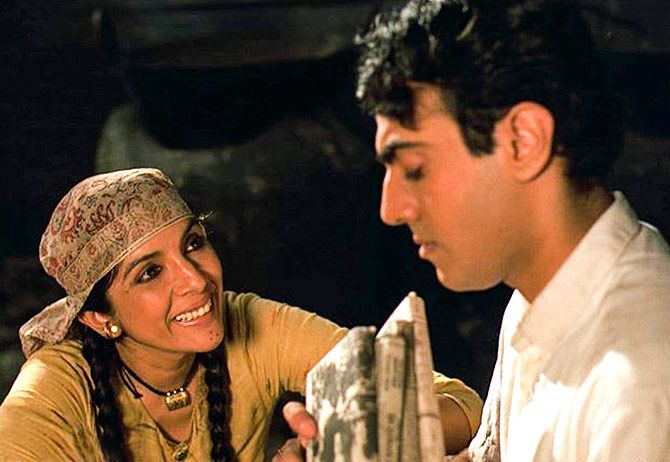
Your first film was Suraj Ka Satvan Ghoda.
Shyam Benegal saw my play Love Letters. He shook my hand and said he wanted to meet me (later).
He gave me the script and asked me to consider the role of Manik Mulla.
I read the book Suraj Ka Satvan Ghoda by Dharamvir Bharati.
K K Raina, who played my assistant in Bymokesh, gave me the novel; it was just 100 pages.
I thought it was brilliant, it had so many layers. I told him it should not be made into a film, it would get messed up.
K K told me to keep my mouth shut and do the film as I had the lead role.
Once the film was made and I saw it, I met Mr Benegal and told him that he had done justice to the book.
I don't think I can do a role like that again. Even today when I watch the film, I forget that it is me.
Since then, you have done 10 films with Mr Benegal -- Mammo (1994), Sardari Begum (1996), The Making Of The Mahatma(1996), Samar (2000), Hari Bhari (2000), Zubeida (2001), Netaji Subhas Chandra Bose: The Forgotten Hero (2005), Welcome to Sajjanpur (2008) and Well Done Abba (2009).
Shyam Benegal is like family.
If he does a film without me, I will probably feel bad because I am so used to being a part of every project that he does.
He has always offered me something different, always throwing a challenge at me.
He trusts me to come up with something and I trust him as much.
I have told him even if I have to play a tree in his film, I will come and stand there.
In Welcome to Sajjanpur, I didn't have to do that one scene. He was very honest about it; he told me there was really nothing in the film for me to do.
There was just one scene of a collector, which he could have got anyone to do. I told him, 'I'm coming, don't do it without me.'
Samar is another brilliant film. It never released.
In fact, that is the first film where you get to see Shyam Benegal's sense of humour. He used the theme of untouchability with a touch of humour.
Which of these films is your favourite?
Suraj Ka Satvan Ghoda was my first film with him. It was a lead role and such a difficult film.
I had a small character in Mammo, but the story is from my point of view.
The Making Of The Mahatma was a huge responsibility. After playing a good Samaritan, he threw Sardari Begum at me, which was a swine of a character.
There have been constant challenges coming my way.
I remember I read the script of Zubeida and told him 'Sir, mere liye toh kuch hai he nahi is film mein. I just have five days of shooting.'
He told me, 'You have read the lines, but you have not read between the lines.'
When people watch the film, they don't believe I have shot for five days because I am there throughout.
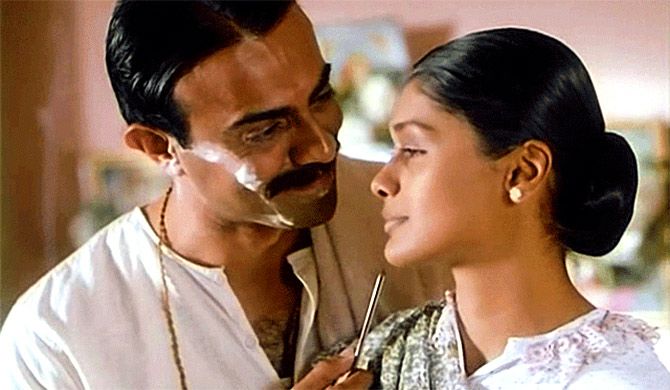
You received a National Award for The Making of The Mahatma.
I was going to play a revolutionary called Kachalya. Then one day, I got a call asking me to come for a make-up test.
They were doing funny things to me -- like giving me larger ears -- but I still didn't understand.
That's when I was told that I'm playing Gandhi. I did not take it seriously because there were so many people testing for it -- Annu Kapoor, Paresh Rawal, Nasseruddin Shah.
I think they took me because they were looking for someone younger.
And by chance, I won the National Award for it! (Laughs.)
It was unexpected because the film was shot in English and only shown on television. I never thought it would even reach the core committee!
You worked in the Malayalam film Agnisakshi. How difficult is it for a Punjabi to mouth Malayalam dialogues?
Not just for Punjabis. It is difficult for anybody in the world to speak Malayalam.
Malayalam is the most difficult language in the world.
I would spend hours and hours -- up to 3 am! -- to get my intonations right for a 7 am shoot.
On the first day of the shoot, when I was trying to say my dialogues, someone was saying my lines from behind somewhere.
I got upset and asked them who was saying my lines after I put in so much effort to speak the language.
I told them to dub it later, but not to have a prompter while I was shooting.
The person who dubbed for me copied my sound and inflections to the T.
Even my close friends who saw the film couldn't believe somebody else had dubbed. That artist got the Kerala State Film Award (Best Dubbing Artist: Murali Menon).
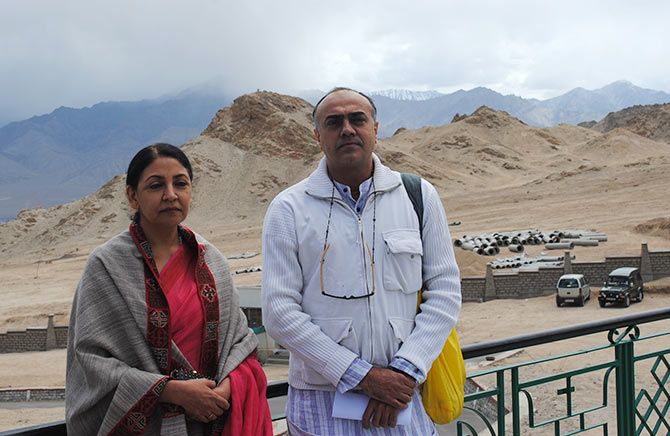
You played a gay character in Do Paise Ki Dhoop, Chaar Aane Ki Baarish, which never released.
I wish that film released. I still don't mind putting some effort in releasing it because Deepti Naval has invested so much emotionally. And such a brilliant performance by Manisha Koirala!
You started a theatre group called Rage in 1992.
Everything happened in 1992, it was an incredible year!
In March, we performed Love Letters, in August, we shot for Suraj Ka Satvan Ghoda... I think Bymokesh Baksi was telecast at the end of 1992.
Rage started with seven people. We are now down to three, but no hard feelings, because at various points of time, each one felt this is not right for them. It's fair enough because we are all friends.
Why don't we see you in television anymore?
I did an episode of Rajiv Bhatia's show with Kitu Gidwani 10 years ago.
Television is so unplanned that I just can't work like this. Basu Chatterjee shot 33 episodes like a film. We shot it in one go.
Today, people make three pilot episodes and after that, work like a machine. I can't work like that.
Even when I was doing a serial called Junoon, where I was one out of 15 characters, I had to shoot for two days in a month. I would tell them to kill my character and let me go because I found it boring.
My only condition was if I don't get the script by midnight, I will not come on the sets to shoot.
Renuka Shahne and I were the only people who put that condition forward. The unit would be very happy on those two days, as the shooting would end at 4 pm, as the script would be ready.
What do you think about today's filmmakers?
I look forward to what Dibaker Banerjee does. He comes up with something unique every time.
Shoojit Sircar has new topics.
I look forward to Vikramaditya Motwane's films. For me, Udaan is probably the best film of the decade.
Lootera was a brilliant film in spite of the box office verdict.
Who is your favourite actor?
I like Ranbir Kapoor's performance in Rockstar.
Ranveer Singh was brilliant in Bajirao Mastani.
Varun Dhawan was good in Badlapur.
How has the industry changed in these 25 years?
We have multiplexes, but our vision is still very small.
We still look at films with A-listers.
There is change, but it's minor.
We still haven't learnt how to invest in stories.

